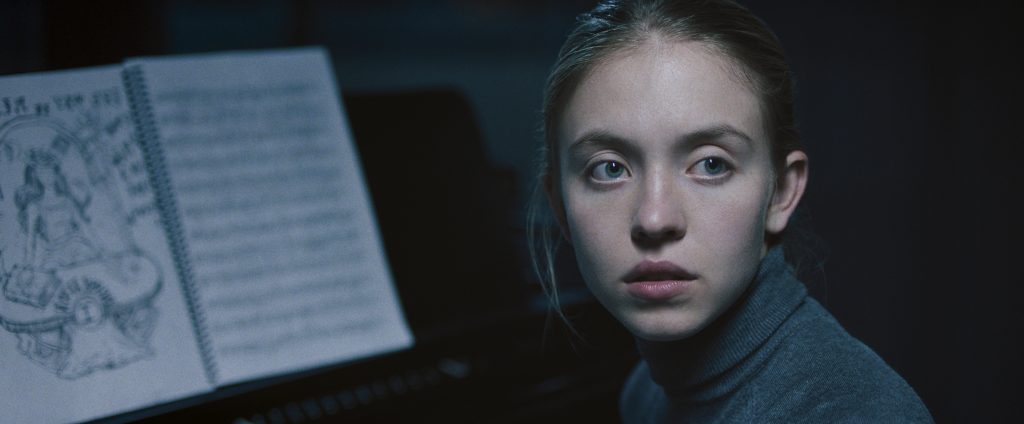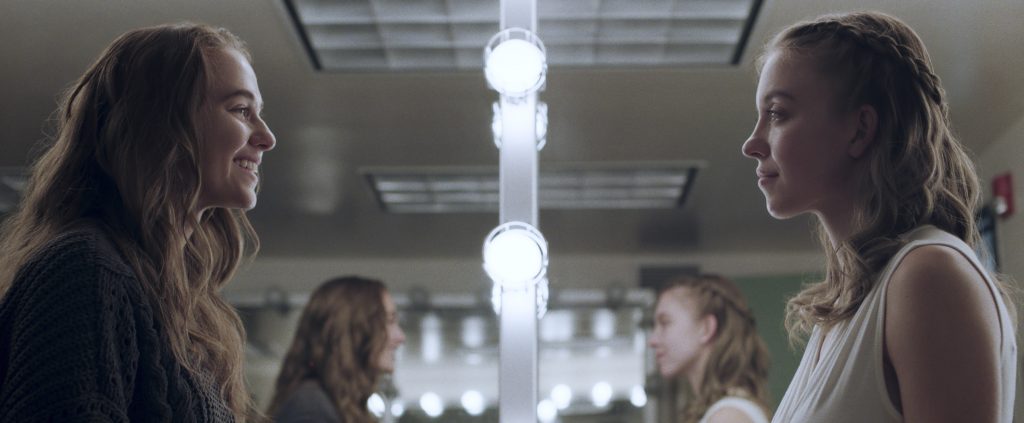Amazon Prime Video, Brandon Keener, horror, Ivan Shaw, Jacques Colimon, Ji Eun Hwang, John Rothman, Julie Benz, Madison Iseman, movies, Prime Video, reviews, Sydney Sweeney, TV, Welcome to the Blumhouse, Zu Quirke
October 13, 2020
by Carla Hay

Directed by Zu Quirke
Culture Representation: Taking place in an unnamed U.S. city, the horror film “Nocturne” has a predominantly white cast of characters (with a few Asians and black people) representing the middle-class and upper-middle-class.
Culture Clash: An evil spirit affects the relationship between fraternal twin sisters who are rival classical pianists.
Culture Audience: “Nocturne” will appeal primarily to people who like teen-oriented horror stories that delivers scares that are effective but not particularly groundbreaking.

“Nocturne” takes an intense sibling rivalry, mixes it in with a lot well-worn occult tropes, and lets the results slowly seep over the audience like a sticky, poisonous stew that’s hard to clean off. The movie doesn’t do a lot that’s very innovative, but quality performances from the cast and the movie’s ability to maintain an unsettling tone throughout the story make it worth watching for people who want to see a teen horror story that isn’t a predictable slasher movie.
“Nocturne” is part of Blumhouse Television’s “Welcome to the Blumhouse” series partnership with Prime Video to showcase horror/thriller movies directed by women and people of color. It’s the feature-film debut by British writer/director Zu Quirke, who set “Nocturne” primarily in an elite American arts school called the Lindbergh Academy. The academy, which is in an unnamed city, is also a co-ed boarding school that’s attended by students from mostly well-to-do families. It’s a school that steeped in tradition and classical music. In other words, the school isn’t for wannabe rock stars and wannabe rappers.
Many of the students have ambitions to become professional musicians in prominent orchestras or as solo stars. Such is the case with fraternal twin sisters Vivian “Vi” Lowe (played by Madison Iseman) and Juliet “Julie” Lowe (played by Sydney Sweeney), who are aspiring classical pianists. Even though their parents David (played by Brandon Keener) and Cassie (played by Julie Benz) are supportive of the twins’ dreams, they also warn Vi (pronounced “vee” in the movie) and Julie that the chances are very slim that they can make a career out of being classical pianists.
There’s a rivalry between the sisters that has been simmering for years but boils over with dangerous intensity during the course of the story, which takes place in the last year that the twins are enrolled in the academy before they graduate. Vi, the older twin, is the “golden child” who excels at everything thing she does. She’s been accepted into the prestigious Juilliard School, while Julie has been rejected by Juilliard and has decided to take a “gap year” before she applies again to Juilliard.
Vi has a loving and attentive boyfriend named Max (played by Jacques Colimon), who’s a little bit of a rebel because he does illegal drugs when he parties, and he admits that he only wants to be a musician because he likes the attention that he gets from women. Vi and Max’s relationship seems to be going well, and Vi is considered a “star” student of the school, both academically and socially. By contrast, Julie is a loner who doesn’t date and is a student who’s hard-working but not considered as exceptional as Vi. It’s no wonder that Julie feels overshadowed and jealous of Vi.
Lindbergh Academy has recently been devastated by the suicide of another star student named Moira Wilson (played by Ji Eun Hwang), a violinist who jumped off of the ledge of one of the school’s buildings. The suicide (which is shown in the beginning of the movie) is shocking because Moira had a promising future and wasn’t considered to be a troubled kid. During a school assembly after the suicide, Lindberg Academy administrators announce that the annual senior competition recital, which is the school’s biggest event, will still go ahead as planned.
One day, while a school administrator is cleaning out Moira’s locker, one of Moira’s notebooks accidentally drops on the ground. Julie happens to be nearby and picks up the notebook. She sees many occult-like illustrations and musical compositions in the notebook. And there’s a strange symbol of the sun on the notebook’s cover. This sun symbol plays a big role in many other parts of the story.
After Julie finds and keeps the notebook, mysterious things start to happen. When she’s in a room that’s used for music practice, she hears a violin playing, but no one is there. She starts having hallucinations and blackouts. Julie is on anti-anxiety medication, but is what she experiencing the side effects of the drug, mental illness, or is it something else? This is a horror movie, so the answer is obvious.
Moira’s notebook seems to have other effects on Julie, as she becomes more arrogant and ruthless in her rivalry with Vi. Julie decides that she’s going to play the same composition that Vi chose for the senior competition recital: Giuseppe Tartini’s “The Devil’s Trill.” Vi is understandably furious with Julie for blatantly trying to copy her, so the feud escalates between the two sisters.
Julie’s one-on-one piano instructor is a middle-aged alcoholic named Roger (played by John Rothman), who used to be an important pianist, but it’s implied that his drinking problem ruined his career as a pianist, and now his job is teaching piano to teenage students. Roger’s alcoholism is still an issue, because Julie mentions during their teaching lessons that she can smell alcohol on his breath.
One day, Julie (who is constantly looking for approval) asks Roger, “Are you proud of me?” He tries to tactfully tell Julie that she’s a good student but doesn’t really have what it takes to be a star soloist. Roger says that Julie is a “sensitive accompanist” and that not everyone can be the conductor of an orchestra.
This “damning with faint praise” triggers some anger in Julie, because she then tells Roger that she wants to quit his class. It leads to an argument where something happens that gets Roger fired. Julie is then assigned to take piano lessons from Dr. Cask (played by Ivan Shaw), who’s considered one of the top instructors in the school because he will only teach the best students. Dr. Cask, who is handsome and distinguished-looking, is also in charge of the senior competition recital, which is judged by a panel of school officials.
“Nocturne” is far from subtle in telegraphing what’s behind the horror in this story. Moira’s notebook is filled with demonic drawings. And when Dr. Cask has a piano lesson with Julie, he comments to her about Vi: “You know what makes her a star? She plays like the devil’s at her door.” And he says of dead student Moira: “She played like the devil is in the room.”
There aren’t many “jump scares” in “Nocturne.” Instead, the horror is more gradual and starts to slowly ramp up as the story moves along. It’s easy to figure out what the source of the terror is, but the appeal to the story is to see how this evil presence is going to affect the relationship between these two sisters.
The movie is told from Julie’s perspective, so Sweeney is the main actor who has to carry the story. Her performance is good, but just like her Julie character, she’s not particularly outstanding. Vi is not as complex as Julie, but Iseman capably shows glimmers into Vi’s interior thoughts that don’t always line up with the “perfect student” image that Vi portrays to almost everyone around her.
The best aspects of “Nocturne” are how writer/director Quirke successfully evokes moods such as toxic jealousy and eerie foreboding in the realistic dialogue and increasingly suffocating environment that surrounds Julie and Vi. The movie’s cinematography from Carmen Cabana also persuasively immerses people into this world. “Nocturne” delivers a knockout ending that will make people wonder if certain people can be possessed by evil or if evil is a manifestation of wicked inclinations that people already have inside themselves.
Prime Video premiered “Nocturne” on October 13, 2020.
